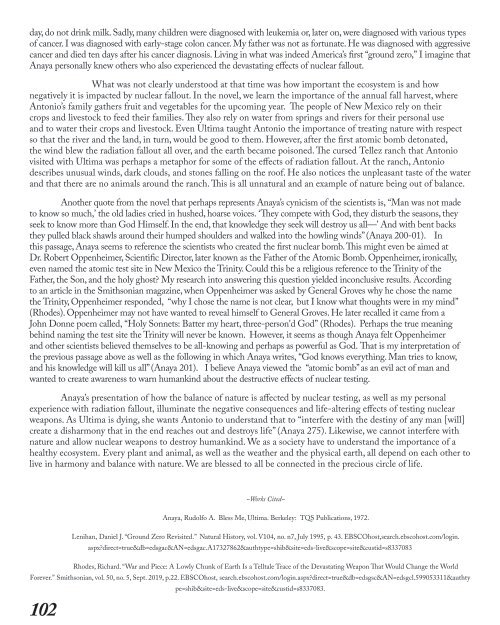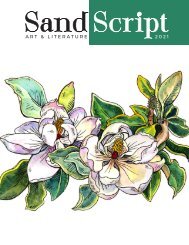SandScript 2022
Art & Literature Magazine
Art & Literature Magazine
You also want an ePaper? Increase the reach of your titles
YUMPU automatically turns print PDFs into web optimized ePapers that Google loves.
day, do not drink milk. Sadly, many children were diagnosed with leukemia or, later on, were diagnosed with various types<br />
of cancer. I was diagnosed with early-stage colon cancer. My father was not as fortunate. He was diagnosed with aggressive<br />
cancer and died ten days after his cancer diagnosis. Living in what was indeed America’s first “ground zero,” I imagine that<br />
Anaya personally knew others who also experienced the devastating effects of nuclear fallout.<br />
What was not clearly understood at that time was how important the ecosystem is and how<br />
negatively it is impacted by nuclear fallout. In the novel, we learn the importance of the annual fall harvest, where<br />
Antonio’s family gathers fruit and vegetables for the upcoming year. The people of New Mexico rely on their<br />
crops and livestock to feed their families. They also rely on water from springs and rivers for their personal use<br />
and to water their crops and livestock. Even Ultima taught Antonio the importance of treating nature with respect<br />
so that the river and the land, in turn, would be good to them. However, after the first atomic bomb detonated,<br />
the wind blew the radiation fallout all over, and the earth became poisoned. The cursed Tellez ranch that Antonio<br />
visited with Ultima was perhaps a metaphor for some of the effects of radiation fallout. At the ranch, Antonio<br />
describes unusual winds, dark clouds, and stones falling on the roof. He also notices the unpleasant taste of the water<br />
and that there are no animals around the ranch. This is all unnatural and an example of nature being out of balance.<br />
Another quote from the novel that perhaps represents Anaya’s cynicism of the scientists is, “Man was not made<br />
to know so much,’ the old ladies cried in hushed, hoarse voices. ‘They compete with God, they disturb the seasons, they<br />
seek to know more than God Himself. In the end, that knowledge they seek will destroy us all—’ And with bent backs<br />
they pulled black shawls around their humped shoulders and walked into the howling winds” (Anaya 200-01). In<br />
this passage, Anaya seems to reference the scientists who created the first nuclear bomb. This might even be aimed at<br />
Dr. Robert Oppenheimer, Scientific Director, later known as the Father of the Atomic Bomb. Oppenheimer, ironically,<br />
even named the atomic test site in New Mexico the Trinity. Could this be a religious reference to the Trinity of the<br />
Father, the Son, and the holy ghost? My research into answering this question yielded inconclusive results. According<br />
to an article in the Smithsonian magazine, when Oppenheimer was asked by General Groves why he chose the name<br />
the Trinity, Oppenheimer responded, “why I chose the name is not clear, but I know what thoughts were in my mind”<br />
(Rhodes). Oppenheimer may not have wanted to reveal himself to General Groves. He later recalled it came from a<br />
John Donne poem called, “Holy Sonnets: Batter my heart, three-person'd God” (Rhodes). Perhaps the true meaning<br />
behind naming the test site the Trinity will never be known. However, it seems as though Anaya felt Oppenheimer<br />
and other scientists believed themselves to be all-knowing and perhaps as powerful as God. That is my interpretation of<br />
the previous passage above as well as the following in which Anaya writes, “God knows everything. Man tries to know,<br />
and his knowledge will kill us all” (Anaya 201). I believe Anaya viewed the “atomic bomb” as an evil act of man and<br />
wanted to create awareness to warn humankind about the destructive effects of nuclear testing.<br />
Anaya’s presentation of how the balance of nature is affected by nuclear testing, as well as my personal<br />
experience with radiation fallout, illuminate the negative consequences and life-altering effects of testing nuclear<br />
weapons. As Ultima is dying, she wants Antonio to understand that to “interfere with the destiny of any man [will]<br />
create a disharmony that in the end reaches out and destroys life” (Anaya 275). Likewise, we cannot interfere with<br />
nature and allow nuclear weapons to destroy humankind. We as a society have to understand the importance of a<br />
healthy ecosystem. Every plant and animal, as well as the weather and the physical earth, all depend on each other to<br />
live in harmony and balance with nature. We are blessed to all be connected in the precious circle of life.<br />
~Works Cited~<br />
Anaya, Rudolfo A. Bless Me, Ultima. Berkeley: TQS Publications, 1972.<br />
Lenihan, Daniel J. “Ground Zero Revisited.” Natural History, vol. V104, no. n7, July 1995, p. 43. EBSCOhost,search.ebscohost.com/login.<br />
aspx?direct=true&db=edsgac&AN=edsgac.A17327862&authtype=shib&site=eds-live&scope=site&custid=s8337083<br />
Rhodes, Richard. “War and Piece: A Lowly Chunk of Earth Is a Telltale Trace of the Devastating Weapon That Would Change the World<br />
Forever.” Smithsonian, vol. 50, no. 5, Sept. 2019, p.22. EBSCOhost, search.ebscohost.com/login.aspx?direct=true&db=edsgsc&AN=edsgcl.599053311&authty<br />
pe=shib&site=eds-live&scope=site&custid=s8337083.<br />
102<br />
103




![SandScript 2023 [Digital Exclusive]](https://img.yumpu.com/68282062/1/190x238/sandscript-2023-digital-exclusive.jpg?quality=85)

